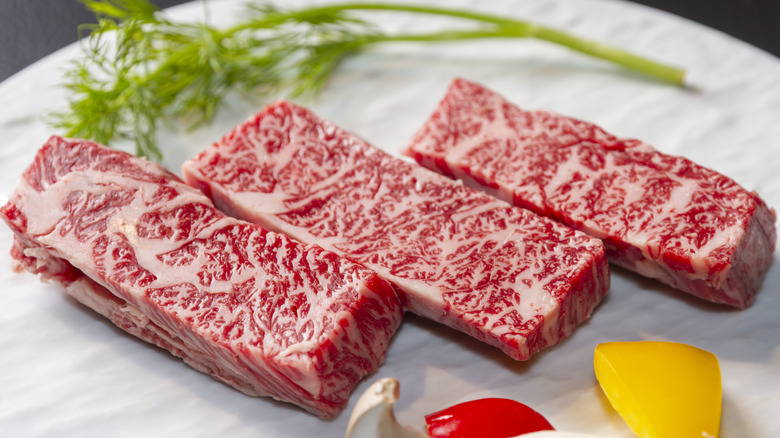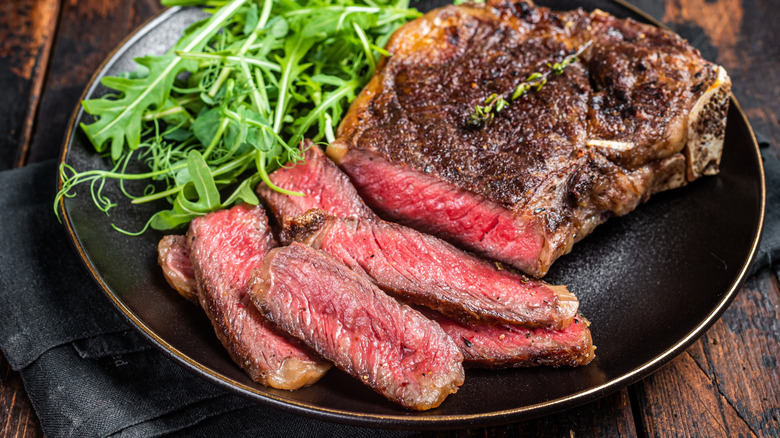The US Steakhouse Chain That Serves Australian Wagyu Beef
Wagyu is widely regarded as the gold standard of steak, featuring some of the rarest types of steak in the world and celebrated for its unparalleled quality, flavor, and texture, which, in our opinion, definitely makes it worth the price tag. Unlike your run-of-the-mill beef, Wagyu comes from a specific breed of Japanese cattle that are meticulously reared in highly controlled conditions, following centuries of unbroken tradition. These include specialized high-grain diets and stress-free environments (with rumours that the cows are even massaged). The purpose of this unique process is to facilitate an increase in intramuscular fat, also known as marbling, which melts at lower temperatures than other types of beef, bestowing upon Wagyu the famous buttery, umami texture that virtually melts in your mouth.
While Wagyu is most prominent in Japan, herds can now be found across the globe, with Australia emerging as the world's second-largest producer. Australian Wagyu has gained recognition for maintaining the same rigorous standards as its Japanese counterpart, making it a favorite among the high-end steakhouses in the United States. One such institute is Steak 48, a steakhouse chain based in Beverly Hills, California.
At Steak 48, you can choose between an 8 oz. and a 12 oz. Australian Tajima Wagyu filet. Unlike many of the other steaks on the menu, the price for this premium cut isn't listed, something that's common at high-end steakhouses. Instead, it's marked as "MP," which stands for market price, reflecting the steak's rarity and the fluctuating cost of sourcing such luxe and highly marbled beef.
What makes Australian Wagyu unique?
Wagyu genetics first made their way to Australia in 1991. Given the breed's centuries-long exclusivity with its ancestral homeland, this was a significant milestone and marked one of the earliest efforts to establish herds outside of Japan. Over the next few years, Australian breeders worked to integrate these prized Wagyu genetics into their cattle programs, carefully following the breeding and feeding practices that make Wagyu special. In 1997, Australia received its first full-blood cow (cows carrying 100% Wagyu genetics), solidifying their position as a leader in Wagyu production outside of Japan. Today, they're globally respected and renowned for Wagyu that features exceptional marbling, quality, and consistency.
So what makes Australian Wagyu different from Japanese Wagyu? Japanese Wagyu is known for its ribbon-like marbling, buttery melt-in-your-mouth texture, and deep umami, cultivated through controlled feeding and stringent grading. On the other hand, Australian Wagyu is usually crossbred with other breeds of cow (commonly Angus), has a shorter feeding them than Japanese Wagyu, and is about 95% Wagyu as opposed to 100% full-blood (per That Fat Cow). The cows are raised in more spacious, varied climates with different grass and soil quality. This affects the taste and texture of the meat, which is characterised as having a richer beefiness, firmer bite, and broader flavor profile than Japanese Wagyu. While it features impressive marbling, it does not reach the ultra-luxurious standards of Japanese A5 Wagyu, and its quality is often considered just a step below the finest Japanese cuts, which is why — within the expensive spectrum of Wagyu — it's typically the more affordable option.


